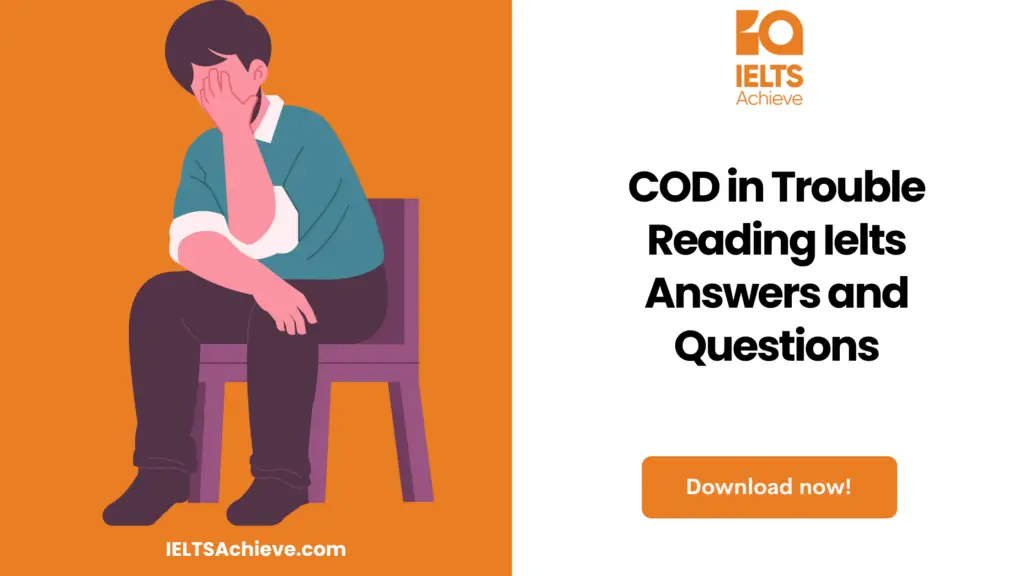The Blog post contains the following IELTS Reading Questions
- IELTS Reading Matching Headings
- IELTS Reading Multiple Choice Questions
- IELTS Reading Yes/No/Not Given
Stay informed and prepared for success – Explore our comprehensive Reading Test Info page to get valuable insights, exam format details, and expert tips for mastering the IELTS Reading section.
IELTS Reading Passage – COD in Trouble

COD in Trouble
In 1992, the Canadian government was compelled to take extreme action and shut down the fishery because the cod stocks off the east coast of Newfoundland had suffered a claustrophobic decline. More than 40,000 individuals lost their jobs, the communities are still trying to recover, and the marine habitat is still on the verge of collapsing. The downfall of this important fishery acted as a wake-up call to governments all over the world, who were taken aback that a very advanced, scientifically based fisheries management system, identical to their own, could have failed so badly. The Canadian government declined to significantly lower quotas, citing the loss of jobs as a major issue, and overlooked warnings claiming that their ships were participating in detrimental fishing techniques.
In the 1950s, Canadian and American east coast waters yielded an annual catch of 100,000 tonnes of cod, which increased to 800,000 metric tons by 1970. By 1975, the catch had dropped to 300,000 tonnes due to overfishing. Canada and the United States reacted by passing legislation to expand their national authority over marine life to 200 nautical miles, resulting in a natural drop in yield to 139,000 tonnes in 1980. But, the Canadian fishing industry acquired control and resumed overfishing, leading to an increase in catches until, starting in 1985, it was Canadians who caught more than 250,000 tonnes of northern cod yearly. This exploitation destroyed the stocks, and by 1990 the catch was so little (29,000 tons) that in 1992(121⁄2000 tons), Canada was compelled to prohibit all fishing in the east coast ocean. In a fishery that had generated a quarter-million-ton harvest for more than a century, there was a biomass of fewer than 1,700 tons, which was also predicted by the fisheries department, even with a swift recovery, it would require at least 15 years for the stocks to be sufficiently healthy to continue fishing at its previous levels.
A lot of money was spent building huge “draggers,” which led to the devastating fishing. Draggers tow massive nets kept open by a mix of big steel plates, heavy chains, and rollers that plough the seabed. They drag up everything in their path, causing tremendous harm, destroying crucial habitats, and participating in the destabilization of the northern cod ecosystem. The draggers targeted large groups of cod as they were spawning when the fish stocks were most vulnerable to catching. The spawning process and environment were severely hindered by the intensive trawling of spawning stocks. In addition, this trawling activity led to the physical dispersion of eggs, leading to a higher failure rate of fertilization. The trawling activity caused physical and chemical harm to larvae, which decreased the probability of their survival. The use of these draggers in Canadian waters is now prohibited permanently.
The overfishing of foreign fleets, which is primarily influenced by capitalist ideology, is commonly cited by Canadian media as the main reason for the decline of North Atlantic cod populations. All of the countries that fished off the coast of Newfoundland employed deep-sea trawlers, and several of them frequently blatantly disregarded the specified catch limits and treaty agreements. There is no question that fishing from nations other than North America had a part in the decline of the cod stock, and the fact that foreign vessels and businesses discovered the capitalist dynamics at work in Canada seemed all too familiar. But it is not possible to put all the responsibility there, regardless of how simple it may be because it does not compensate for the management of the resources.
Who should be blamed for this? Because the exploitation of the Newfoundland fishery was so heavily influenced by the government, we can claim that a fishery is not a private place since it lacks management rights generally associated with property and common property. All management choices were made on behalf of the state, which has acquired ownership of the land. Fishermen are instructed on who and what they are permitted to fish for and what to do with the fish after it is caught. In this sense, the downfall of a resource like the fisheries in Newfoundland serves as a catastrophe of government negligence rather than of the general public.
An estimated 30,000 people lost their jobs once the 1992 Northern Cod Moratorium went into effect, as well as another 12,000 fishermen and plant employees who followed them after the 1992 ban on fishing for northern cod and the majority of other species. More than 40,000 people lost their occupations, turning Newfoundland into an economic catastrophe zone as processing plants closed and ships of all sizes—from small dories to huge draggers—were left idle or sold for cheap to foreign nations. A large number of Newfoundland communities were destroyed.
Europeans only need to look across the North Atlantic to predict the future of their cod fishery. Instead of creating strong business strategies to match fishing with the resource’s limited availability, Canada was too preoccupied with making plans, establishing big aims, and then allocating a huge amount of fish. Cod stocks in European waters are currently so low that scientists have now warned that “all cod-targeting fisheries within that region should be closed down.” The calamity in Canada illustrates that we have the technological power to locate and eradicate any commercial fish stock in any ocean and thereby cause irreparable harm to entire ecosystems. In the case of Canada, the two-billion-dollar recovery bill could only reflect a part of the total long-term expenses. The consequences for people and desperate communities who are now denied access to meaningful and long-term jobs are staggering.
Unlock your full potential in the IELTS Reading section – Visit our IELTS Reading Practice Question Answer page now!
Recommended Questions:
Renewable Energy IELTS Reading Question with Answer
COD in Trouble IELTS Reading Questions
Questions 1 – 6
The Reading Passage has 7 paragraphs (A – G). From the list of headings below choose the most suitable headings for paragraphs B – G. Write the appropriate number (i – xi).NB There are more headings than paragraphs, so you will not use them all.
| Example | Answer |
| Paragraph A | viii |
List of Headings
i. European Techniques
ii. Foreign Over-Fishing
iii. Lessons to be Learned
iv. The Human Cost
v. Canadian Fishing Limitsvi. The Breaking of Agreementsvii. The Tragedy of State Mismanagementviii. A Warning to the Worldix. Factory Closuresx. The Demise of the Northern Codxi. Destructive Trawling Technology
- Paragraph B
- Paragraph C
- Paragraph D
- Paragraph E
- Paragraph F
- Paragraph G
Ready to conquer Matching Headings questions? Click here to learn essential tips and techniques for matching headings accurately to paragraphs or sections in the IELTS Reading section.
Questions 7 – 9
Choose the appropriate letters A – D and write them in boxes 7 – 9 on your answer sheet.
7. According to the Reading Passage, which statement about Newfoundland’s fisheries is currently true?
- Although no cod fishing is allowed, some other types of fish can be caught.
- Per year only 1700 tons of catches are allowed.
- In 2007, fishing with draggers will be permitted again.
- In 2007, normal fishing can restart.
8. Who is the author blaming for the downfall of the Newfoundland cod fishery?
- The US fishing industry
- The Canadian government
- The foreign fishing industry
- The Canadian fishing industry
9. The Canadian government did not intend to decrease cod catches before 1992 as it was concerned about…
- the marine ecosystem
- drastic measures
- possible rising unemployment
- the ecological effects
Ready to improve your performance in Multiple Choice Questions (MCQs)? Click here to access our comprehensive guide on how to tackle MCQs effectively in the IELTS Reading section.
Questions 10 – 13
Do the following statements agree with the views of the writer of the reading passage on COD in Trouble? In boxes 10 – 13 write
YES if the statement agrees with the writer
NO if the statement doesn’t agree with the water
NOT GIVEN if it is impossible to say what the writer thinks about this
10.Foreign fishermen and Canadian government officials often came into conflict.
11.The Newfoundland cod tragedy was mainly caused by the disruption of cod breeding.
12.Europe does not have to face the severity of the Canadian tragedy.
13. Foreign trawlers often violated their catch allowances.
Want to excel in identifying the writer’s views and claims? Click here to explore our in-depth guide on how to accurately determine Yes, No, or Not Given in the IELTS Reading section.
Unlock your full potential in the IELTS Reading section – Visit our IELTS Reading Practice Question Answer page now!
Recommended Questions:
Renewable Energy IELTS Reading Question with Answer
COD in Trouble Reading Answers
1. x
2. xi
3. ii
4. vii
5. iv
6. iii
7. D
8. B
9. C
10. Not Given
11. Yes
12. No
13. Yes

We hope you found this post useful in helping you to study for the IELTS Test. If you have any questions please let us know in the comments below or on the Facebook page.
The best way to keep up to date with posts like this is to like us on Facebook, then follow us on Instagram and Pinterest. If you need help preparing for the IELTS Test, join the IELTS Achieve Academy and see how we can assist you to achieve your desired band score. We offer an essay correction service, mock exams and online courses.

